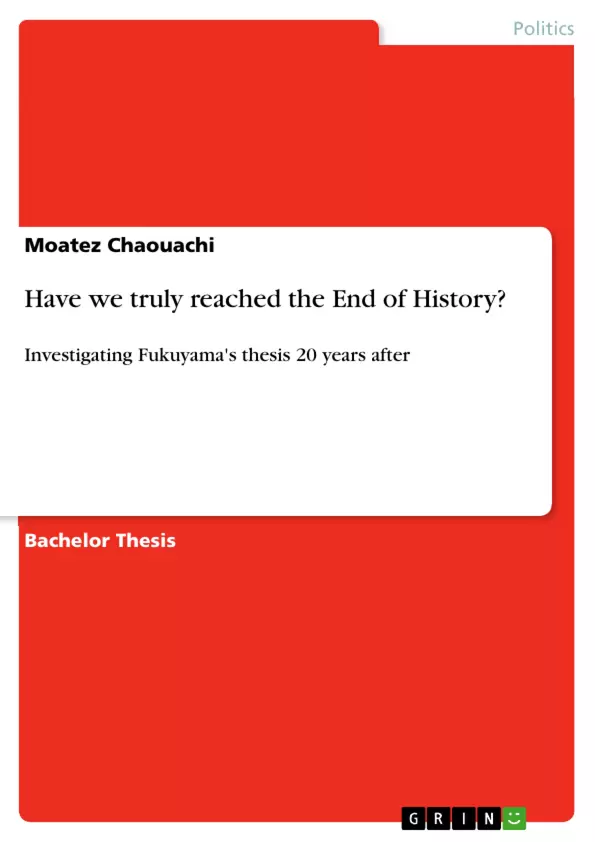The core purpose of the ongoing study consists in the critical examination of Francis Fukuyama’s thesis “The End of History and the Last Man”. Moreover, the significance of the present research lies in the contrast between Fukuyama’s arguments and the contemporary state of world affairs, taking into consideration the fact that the researcher’s “The End of History and the Last Man” was elaborated twenty years ago.
Inhaltsverzeichnis (Table of Contents)
- CHAPTER I: INTRODUCTION
- CHAPTER II: HAVE WE TRULY REACHED THE END OF HISTORY?
- 2.1. Introductory notes
- 2.2. Fukuyama's conception of “liberal democracy”
- 2.3. The collapse of nationalism in the “end of history”
- 2.4. The empirical presupposition that all alternatives to liberalism have been eliminated
- 2.5. The normative assertion that liberalism is superior to all ideological alternatives
- 2.6. The validity of a modern form of socialism as a suitable alternative to “unviable” liberal democracy
- CHAPTER IV: RESULTS
Zielsetzung und Themenschwerpunkte (Objectives and Key Themes)
The main objective of this paper is to investigate the viability of Fukuyama's "end of history" thesis 20 years after its declaration. The paper aims to analyze the validity of Fukuyama's arguments and consider potential alternatives to liberal democracy in the face of contemporary challenges.
- Fukuyama's conception of “liberal democracy”
- The role of nationalism in the “end of history”
- The viability of alternatives to liberalism
- The normative arguments for the superiority of liberalism
- The potential of modern socialism as an alternative to liberal democracy
Zusammenfassung der Kapitel (Chapter Summaries)
Chapter I introduces the research topic, outlining the contemporary context of the debate on the "end of history." It highlights the relevance of Fukuyama's thesis to contemporary social and political realities, particularly in the context of the "Occupy Wall Street" movement and the challenges to capitalism. The chapter also outlines the research objectives and hypotheses to be examined in the study.
Chapter II examines Fukuyama's concept of "liberal democracy" and its role in his "end of history" thesis. The chapter explores the arguments presented by Fukuyama regarding the superiority of liberal democracy over other political systems, including hereditary monarchy, fascism, and communism. It also critically evaluates the empirical and normative arguments underpinning Fukuyama's thesis.
Schlüsselwörter (Keywords)
The key themes and concepts explored in this paper include liberal democracy, the end of history, Fukuyama's thesis, nationalism, socialism, capitalism, political philosophy, and ideological contestations. The paper investigates the empirical and normative arguments for and against the viability of liberal democracy as the final form of human government.
Frequently Asked Questions
What is Francis Fukuyama's "End of History" thesis?
Fukuyama argued that liberal democracy might constitute the "end point of mankind's ideological evolution" and the final form of human government.
How does the paper critique Fukuyama's arguments?
The paper contrasts Fukuyama's 20-year-old arguments with contemporary world affairs, such as the Occupy Wall Street movement and the persistence of nationalism.
Does the paper suggest any alternatives to liberal democracy?
Yes, it explores the validity of modern forms of socialism as potential alternatives to what it calls "unviable" aspects of liberal democracy and capitalism.
What role does nationalism play in this debate?
Fukuyama predicted the collapse of nationalism in the "end of history," but the study examines whether this empirical presupposition holds true today.
Is liberal democracy considered superior in this study?
The paper critically evaluates the normative assertion that liberalism is superior to all ideological alternatives, analyzing both its strengths and modern failures.
- Arbeit zitieren
- Moatez Chaouachi (Autor:in), 2012, Have we truly reached the End of History?, München, GRIN Verlag, https://www.grin.com/document/197627



